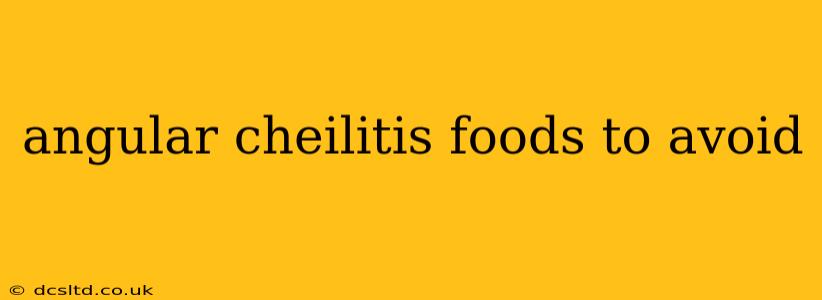Angular cheilitis, also known as perleche, is a common condition characterized by cracks and sores at the corners of the mouth. While various factors can contribute to its development, including nutritional deficiencies and infections, dietary choices play a significant role in both its onset and healing process. Understanding which foods to avoid is crucial for managing and preventing angular cheilitis. This comprehensive guide delves into the dietary aspects of this condition, providing you with actionable insights to support your recovery.
What Causes Angular Cheilitis?
Before we dive into the foods to avoid, let's briefly explore the root causes of angular cheilitis. This condition often arises from a combination of factors:
- Nutritional Deficiencies: A lack of essential vitamins like B vitamins (especially riboflavin, niacin, and B12), iron, and zinc can weaken the skin barrier, making it more susceptible to infection and inflammation.
- Infections: Fungal infections (like Candida albicans) and bacterial infections are common culprits, exacerbating the condition.
- Skin Irritation: Excessive licking or drooling, along with saliva accumulating in the mouth corners, can irritate the delicate skin, leading to cracks.
- Poor Oral Hygiene: Neglecting proper oral hygiene can create a breeding ground for bacteria and fungi.
- Allergies: Certain food allergens may contribute to inflammation and worsen symptoms.
Foods to Avoid with Angular Cheilitis
Certain foods can either worsen existing angular cheilitis or increase your susceptibility to developing it. Here's a breakdown of food categories and specific items to avoid:
1. Foods High in Sugar
Why avoid them? High-sugar foods provide a breeding ground for yeast and bacteria, fueling infections that can exacerbate angular cheilitis. The sugary environment encourages the growth of Candida albicans, a common fungal culprit.
Examples: Candy, sugary drinks (soda, juice), pastries, processed foods with added sugars, honey.
2. Highly Processed Foods
Why avoid them? Processed foods are often low in nutrients and high in additives that can irritate the delicate skin around your mouth. Some additives may also trigger allergic reactions.
Examples: Fast food, packaged snacks, processed meats.
3. Foods that Trigger Allergic Reactions
Why avoid them? Allergic reactions can lead to inflammation and worsen existing angular cheilitis. Identifying and eliminating food allergens is crucial for managing the condition.
Examples: Dairy products (milk, cheese, yogurt) are common culprits for some individuals. Peanuts, tree nuts, soy, and wheat are also potential allergens. Keep a food diary to pinpoint your specific triggers.
4. Foods that Dry Out the Mouth
Why avoid them? Dehydration can exacerbate cracking and inflammation. Foods that have a drying effect on the mouth can worsen symptoms.
Examples: Excessive caffeine intake (coffee, tea), alcohol.
5. Acidic Foods
Why avoid them? Highly acidic foods can irritate the already damaged skin at the corners of your mouth, delaying healing.
Examples: Citrus fruits (oranges, lemons, limes), tomatoes, vinegar-based dressings.
Frequently Asked Questions (FAQs)
Here are some common questions about angular cheilitis and the foods you should avoid:
What vitamins are important for healing angular cheilitis?
Several B vitamins (riboflavin, niacin, B12), iron, and zinc are crucial for skin health and healing. A balanced diet rich in these nutrients is essential.
Can dairy products worsen angular cheilitis?
For some individuals, dairy products can trigger an allergic reaction or contribute to inflammation, worsening angular cheilitis. Others tolerate dairy without issue. If you suspect a dairy allergy, eliminate it from your diet temporarily to see if it improves your symptoms.
How long does it take for angular cheilitis to heal?
The healing time varies depending on the severity of the condition and the underlying cause. With proper treatment and dietary modifications, it typically heals within a few weeks. However, persistent or recurring angular cheilitis requires professional medical attention.
Should I avoid spicy foods with angular cheilitis?
Spicy foods can irritate the sensitive skin at the corners of your mouth, potentially delaying healing. It's best to avoid them until the condition improves.
Remember, this information is for general knowledge and shouldn't replace professional medical advice. If you're experiencing angular cheilitis, consult a doctor or dermatologist for proper diagnosis and treatment. They can help identify the underlying cause and recommend appropriate dietary and medical interventions. A balanced diet, good oral hygiene, and attention to any potential allergens are key to managing and preventing this common condition.
